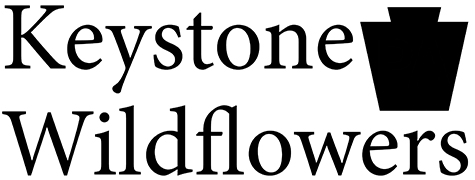Pollinator Friendly
Showing 1–24 of 104 results
These plants attract pollinators like butterflies, bees, and birds.
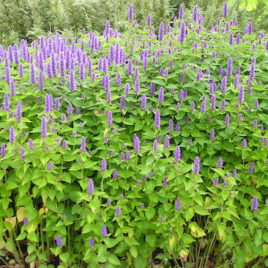
Agastache foeniculum
Agastache foeniculum, or Anise Hyssop, is a 2-3 foot perennial member of the mint family. Anise Hyssop’s leaves produce a strong anise or licorice scent when crushed, and its bluish-purplish flowers appear in July through September. The plant grows in … Continued
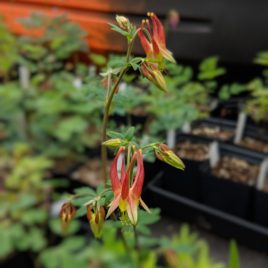
Aquilegia canadensis
Aquilegia canadensis, or Columbine, is a classic woodland wildflower with lacy blue-green foliage and beautiful red and yellow flowers. Hummingbirds flock to its flowers, and it reseeds itself freely.
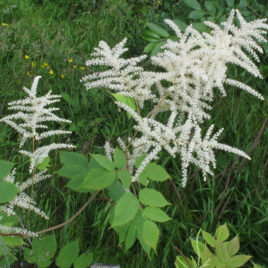
Aruncus dioicus
Aruncus dioicus, or Goat’s Beard, is a perennial member of the rose family growing in moist woods, meadows, and along streams. Goat’s Beard is a very showy plant growing 3 to 5 feet tall in large bushy clumps. The plant … Continued
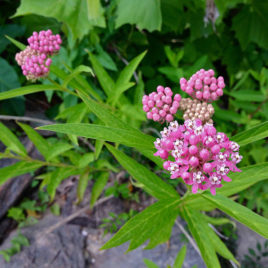
Asclepias incarnata
Asclepias incarnata, or Red Milkweed, is a 3-5 foot perennial perfect for full sun and moist to wet soils. Red Milkweed, or Swamp Milkweed, blooms with reddish flowers from June to July. Its leaves are the preferred food of Monarch … Continued
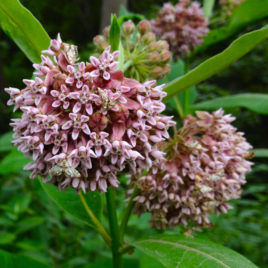
Asclepias syriaca
Asclepias syriaca, or Milkweed, is a herbaceous perennial with pink flowers serving as a great nectar source for butterflies. Its leaves are a food source for Monarch butterfly larvae. Milkweed, or Common Milkweed, is easily grown in average, dry to … Continued
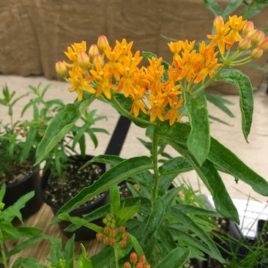
Asclepias tuberosa
Asclepias tuberosa, or Butterfly Milkweed is a 1-2 foot dazzling member of the Milkweed family. Butterfly Milkweed leaves are lance-shaped, and its flowers are a brilliant orange. Preferring dry to medium, well-drained soils in full sun, Butterfly Milkweed appears from … Continued
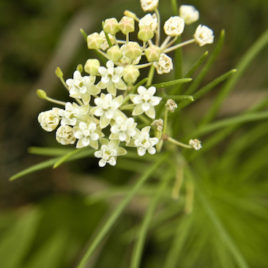
Asclepias verticillata
Asclepias verticillata, or White Milkweed, is a deep-rooted perennial with small greenish-white flowers blooming in small clusters between July to August. The late-blooming milkweed makes it a valuable late-season food source for Monarch butterflies and their caterpillars.
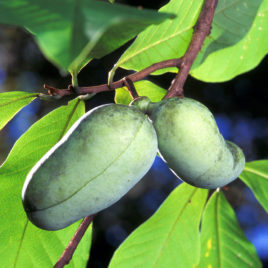
Asimina triloba
Asimina triloba, or Paw Paw, is a large, 15-foot, native shrub producing a large yellow-green to brown fruit. The sweet, custardy fruits are the largest edible fruit indigenous to the US. Paw Paw grows in sun to part sun and … Continued
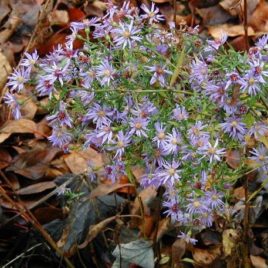
Aster cordifolius
Aster cordifolius, or Blue Wood Aster, is a 2-3 foot perennial for partially shaded sites in dry or moist soil. Blue Wood Aster is often found at the edge of woods with clouds of blue flowers appearing in early fall. … Continued
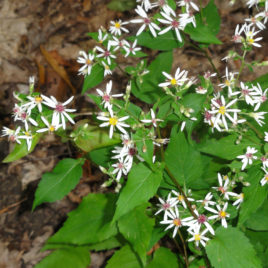
Aster divaricatus
Aster divaricatus, or White Wood Aster, is a low mounding, rhizomatous perennial that is typically the first aster to bloom in late summer. White Wood Aster produces white ray flowers with light pink centers that are sure to brighten your … Continued
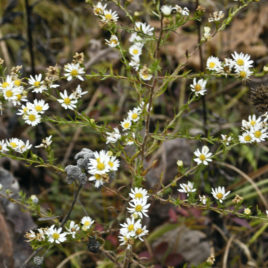
Aster ericoides
Aster ericoides, or Heath (White) Aster, is a 2-3 foot perennial for full sun, well-drained soils. Heath (White) Aster has very prolific tiny white flowers that appear in late summer to early fall. It is also a great butterfly food … Continued
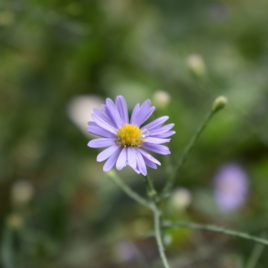
Aster laevis
Aster laevis, or Smooth Blue Aster, is a 2-4 foot hardy perennial for full to part sun and dry to medium moist soils. Smooth Blue Aster has leaves and stems with a pale glaucous bloom and deep blue flowers appearing … Continued
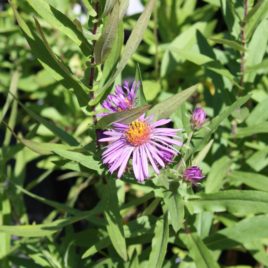
Aster novae-angliae
Aster novae-angliae, or New England Aster, is a 3-5 foot perennial for full to part sun and moist, damp soils. New England Aster’s very showy, deep violet to purple flowers appear in late summer to early fall. It is a … Continued
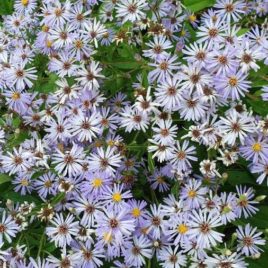
Aster novi-belgii
Aster novi-belgii, or New York Aster, is a sturdy, clump-forming perennial with lance-shaped leaves and rings of purple or pink flowers surrounding yellow disc centers. It typically produces more blooms than New England Aster. New York Aster thrives in moist, … Continued
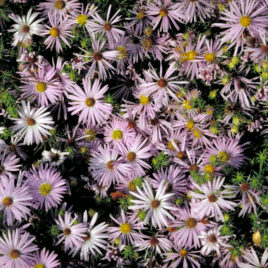
Aster oblongifolius
Aster oblongifolius, or Aromatic Aster, is a 1-2 foot perennial for full sun to part shade and medium to dry, well-drained soils. The perennial is very drought tolerant. The branching stems of Aromatic Aster feature violet flowers with yellow centers … Continued
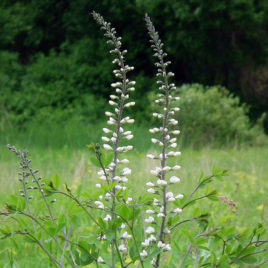
Baptisia alba
Baptisia alba, or White Wild Indigo, is a 2-4 foot, long-lived herbaceous perennial that prefers full to part sun and dry to medium, moist soils. Although White Wild Indigo tolerates poor soils. All Baptisia species are nitrogen-fixing legumes, meaning they … Continued
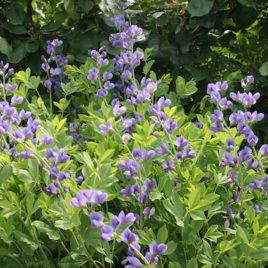
Baptisia australis
Baptisia australis, or Blue Wild Indigo, is a 3-5 foot, hardy, long-lived perennial legume for full sun to light shade and well-drained medium moist soils. The attractive, dark blue flowers and glossy blue-green trifoliate leaves on Blue Wild Indigo bloom … Continued
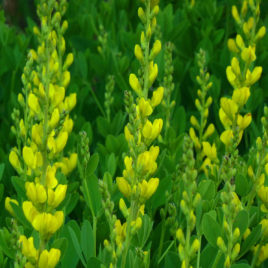
Baptisia tinctoria
Baptisia tinctoria, or Yellow Wild Indigo, is a shrub-like perennial with silvery, gray-green leaves and bright pea-shaped flowers in late spring. The plant grows best in full sun or part sun. Young plants tend to get off to a slow … Continued
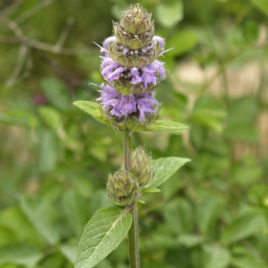
Blephilia ciliata
Blephilia ciliata, or Downy Wood Mint, is a perennial with tight purple flowers stacked on top of each other, reaching up to one foot tall. It thrives in almost any soil from dry to moist and requires full to part … Continued
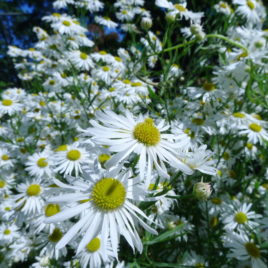
Boltonia asteroides
Boltonia asteroides, or False Aster, is a 2-4 foot perennial for full to part sun and wet to damp and dry soils. False Aster’s showy white to pink flowers appear in late summer to early fall. The flowers provide nectar … Continued
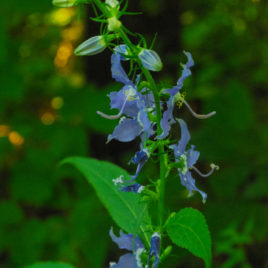
Campanula americana
Campanula americana, or Tall Bell Flower, is a 4-5 foot biennial for full shade to full sun and rich, well-drained, moist soils. Its deep blue flowers appear in July to early September. Tall Bell Flower is found in moist meadows … Continued
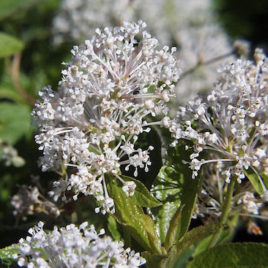
Ceanothus americanus
Ceanothus americanus, or New Jersey Tea, is a 2-3 foot, hardy, perennial, woody shrub for well-drained dry to medium soils in part to full sun. New Jersey Tea produces bright white flowers growing in July through August. Younger plants get … Continued
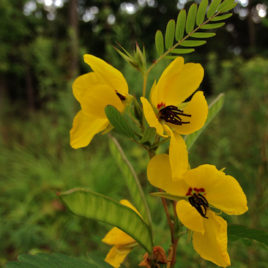
Chamaecrista fasciculata
Chamaecrista fasciculata, or Partridge Pea, is an annual plant with yellow flowers with deep red stamens favored by bees and other pollinators, blooming June to August. Partridge Pea features symmetrical foliage with blue-green leaves that retreat when touched.
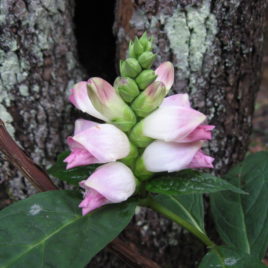
Chelone glabra
Chelone glabra, or Turtlehead, is a 2-3 foot wetland perennial for wet meadows and rich moist to average soils that blooms in late summer-early fall. Turtlehead’s creamy white flower resembles a turtle’s head. It serves as a nectar plant and … Continued

